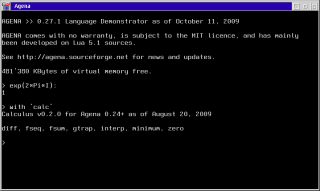Agena is an easy-to-learn procedural programming language suited for everyday usage. It has been implemented as an interpreter and can be used in scientific, educational, linguistic, and many other applications. Its syntax looks like very simplified Algol 68 with elements taken from Lua and SQL.
Agena
Version:
6.8.1
Release date:
Monday, 9 March, 2009
Categories:
License:
- GPL
Interface:
- VIO
Manual installation
Following ones are the download links for manual installation:
| Agena v. 6.8.1 (16/2/2026, Alexander Walz) | Readme/What's new |
agena >>
`The Power of Procedural Programming`
6.8.1 Kashan, February 16, 2026
- Sets could not store more than one complex number. This decades-long bug has been fixed.
- Numbers passed to `dual` package functions are now treated as differentiable entities. So an Agena number x internally is no longer
converted to the dual number dual.new(x, 0, 0, 0, 0, 0, 0, 0) but to dual.new(x, 1, 1, 0, 1, 0, 0, 0), to avoid confusion when mixing
numbers with dual numbers in `dual` package function calls.
- `arctan` and `arccot` sometimes returned a wrong results. This has been fixed.
- This release has been Valgrind-checked on x86 and x64 Linux to ensure there are no internal errors or memory leaks. |
 sourceforge.net/projects/agena/files/Binaries/Agena 6.8.1/agena-6.8.1-os2.wpi/download sourceforge.net/projects/agena/files/Binaries/Agena 6.8.1/agena-6.8.1-os2.wpi/download |
||
| Agena v. 4.12.5 (20/5/2025, Alexander Walz) | Readme/What's new |
4.12.5 Merryville, May 20, 2025
- In the past, the bitshift operators <<< (left shift), >>> (right shift), <<<< (left rotation) and >>>> (right rotation) had different behaviour across platforms when a number at or beyond the +/-2^32 threshold has been processed. This has been changed and the results in these situations are now the same.
Likewise, `bytes.numto32` is now returning the same results on all platforms when casting a value at or beyond the +/-2^32 border.
This also benefits various functions in the `hashes` package as their returns are now the same across platforms, as well.
To check the new underflow or overflow behaviour, use `math.wrap`.
- New function `math.fmod` works and returns the same result as the binary `symmod` operator. It has just been added to facilitate porting C code to Agena.
- The results of `hashes.mix`, `hashes.crc32`, `hashes.crc8`, `hashes.reflect`, `hashes.parity`, `hashes.fibmod`, `hashes.interweave`, `hashes.jinteger` may now be different with out-of-range input, that is with arguments at or beyond the 2^32 threshold, depending on your platform. |
 www.hobbesarchive.com/Hobbes/pub/os2/dev/proglang/misc/Agena_4-12-5.wpi www.hobbesarchive.com/Hobbes/pub/os2/dev/proglang/misc/Agena_4-12-5.wpi |
||
| Agena Manual v. 6.8.1 (, Alexander Walz) | ||
 sourceforge.net/projects/agena/files/Manuals/agena.pdf/download sourceforge.net/projects/agena/files/Manuals/agena.pdf/download |
||
| Agena source code v. 6.8.1 (Source code, , Alexander Walz) | ||
 sourceforge.net/projects/agena/files/Sources/agena-6.8.1-src.tar.gz/download sourceforge.net/projects/agena/files/Sources/agena-6.8.1-src.tar.gz/download |
Record updated last time on: 17/02/2026 - 20:13

This work is licensed under a Creative Commons Attribution 4.0 International License.



Comments
Alexander Walz
Sat, 13/05/2017 - 20:06
Permalink
Hello,
Add new comment